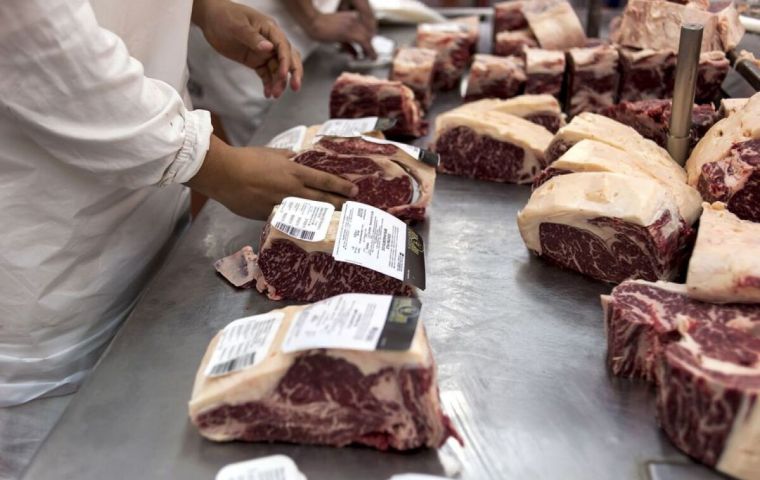MercoPress. South Atlantic News Agency
Those who disregard Argentina's market will be banned from exporting beef
 Exporters should have supplied 6,000 tons of beef to the local market in February, but instead only 2,500 tons were delivered
Exporters should have supplied 6,000 tons of beef to the local market in February, but instead only 2,500 tons were delivered Argentina's Agriculture and Livestock Minister Julián Domínguez has warned beef exporters that those who fail to supply the local market in accordance with the Government's plan will be banned from selling their products abroad.
“I informed them that those who do not comply with the commitments assumed with the Argentine people will not be able to continue exporting beef,” said Domínguez on Twitter.
“I made this decision in the context of the [Ukraine] war conflict that drove global increases in food prices, a situation that adds to the crisis that our livestock is going through due to the drought, the fires in Corrientes, and the shortage of 1.5 million head of cattle”, he added.
The Consorcio ABC, which groups the major exporting companies, had warned Secretary of Domestic Trade Roberto Feletti and Domínguez himself earlier this week that they were not going to continue with the Cared-for Cuts supply program, which allocates 12,000 tons per month to the local market, with 6,000 tons stemming from supermarket chains and the other 6,000 tons from exporters.
Regarding this last tonnage, about 5,400 tons, are supplied by Consorcio ABC, while the remaining 10% is shared among the Federación de Industrias Frigoríficas Regionales (Fifra), with 300 tons, and the Unión de la Industria Cárnica Argentina (Única), with another 300 tons.
“Our meat-packing plants are not going to stop delivering,” Daniel Urcía, president of Fifra, told the Buenos Aires daily La Nación. “We have been delivering quite well,” he added.
Domínguez's decision comes after Feletti threatened ABC to invoke the supply law to guarantee deliveries to butchers.
The exporters cited “informality in exports, lack of transparency in the allocation [of exports], under-invoicing [of companies outside the industry], lack of foreign currency income” and the existence of “de facto quotas” to justify their measures.
But the authorities disagreed with the “lack of transparency” part. ”Every Thursday, at 14:00, the three chambers (that is ABC, the Union of the Argentine Meat Industry and the Federation of Argentine Regional Cold Storage Industries) endorse the follow-up (of foreign sales) where the tonnage to be exported was agreed upon,“ ministry sources pointed out.
In January 52,000 tons of beef were exported and in February it amounted to 62,000 tons. The sources said 82% stemmed from ABC, 2.4% from Fifra, and 4.5% from Única, while 11% came from operators without a plant. These accurate figures would prove there is no such thing as informality either, the Ministry sources claimed.
”Every Thursday at 2 p.m. there is a follow-up meeting and nobody complained. If there is any problem, it is theirs because we do not interfere in the export programs of the companies“, they specified.
So far 27,500 tons have already been approved in March.
The exporting chambers had signed an agreement to supply 6,000 tons of meat per month to the local market at reduced prices. That was renewed last February. ”They defaulted, out of 6000 tons, it was 2500 tons in February,” the Ministry officials insisted.
(Source: La Nación)




Top Comments
Disclaimer & comment rulesCommenting for this story is now closed.
If you have a Facebook account, become a fan and comment on our Facebook Page!